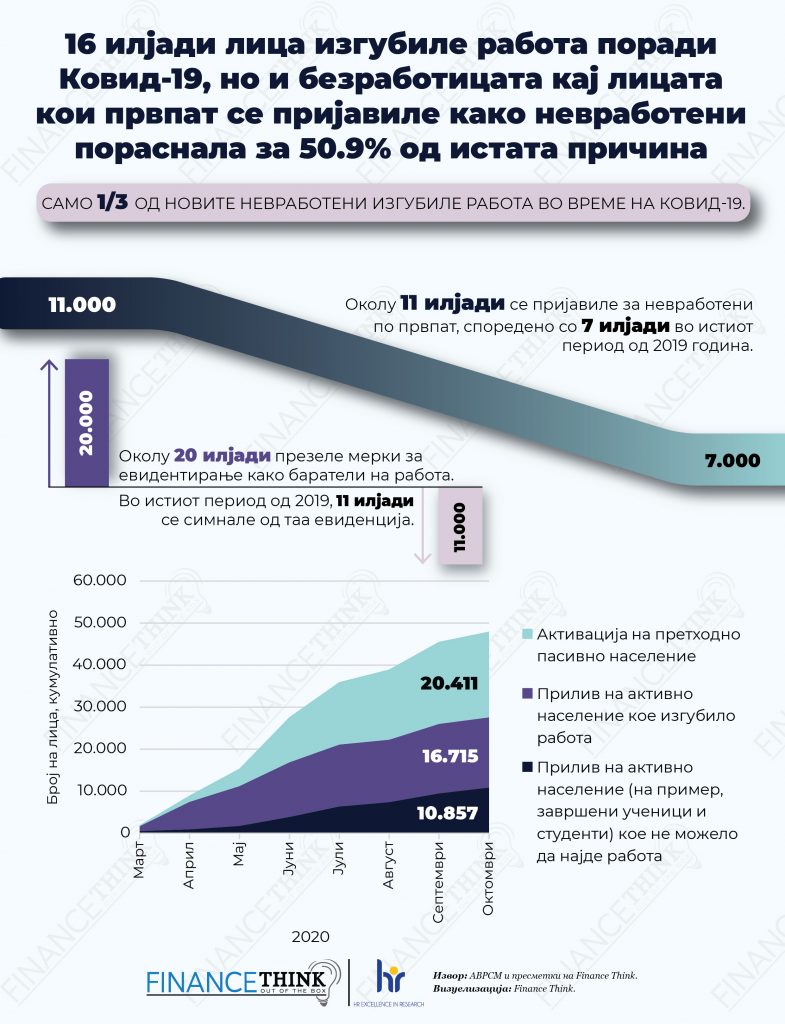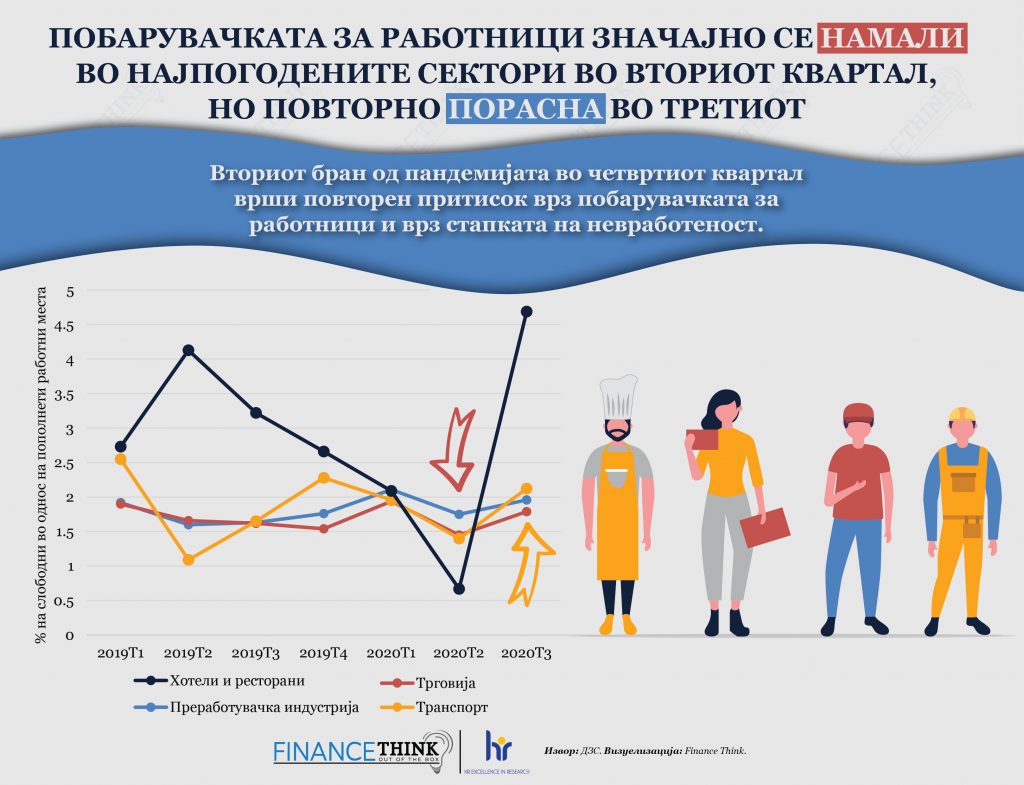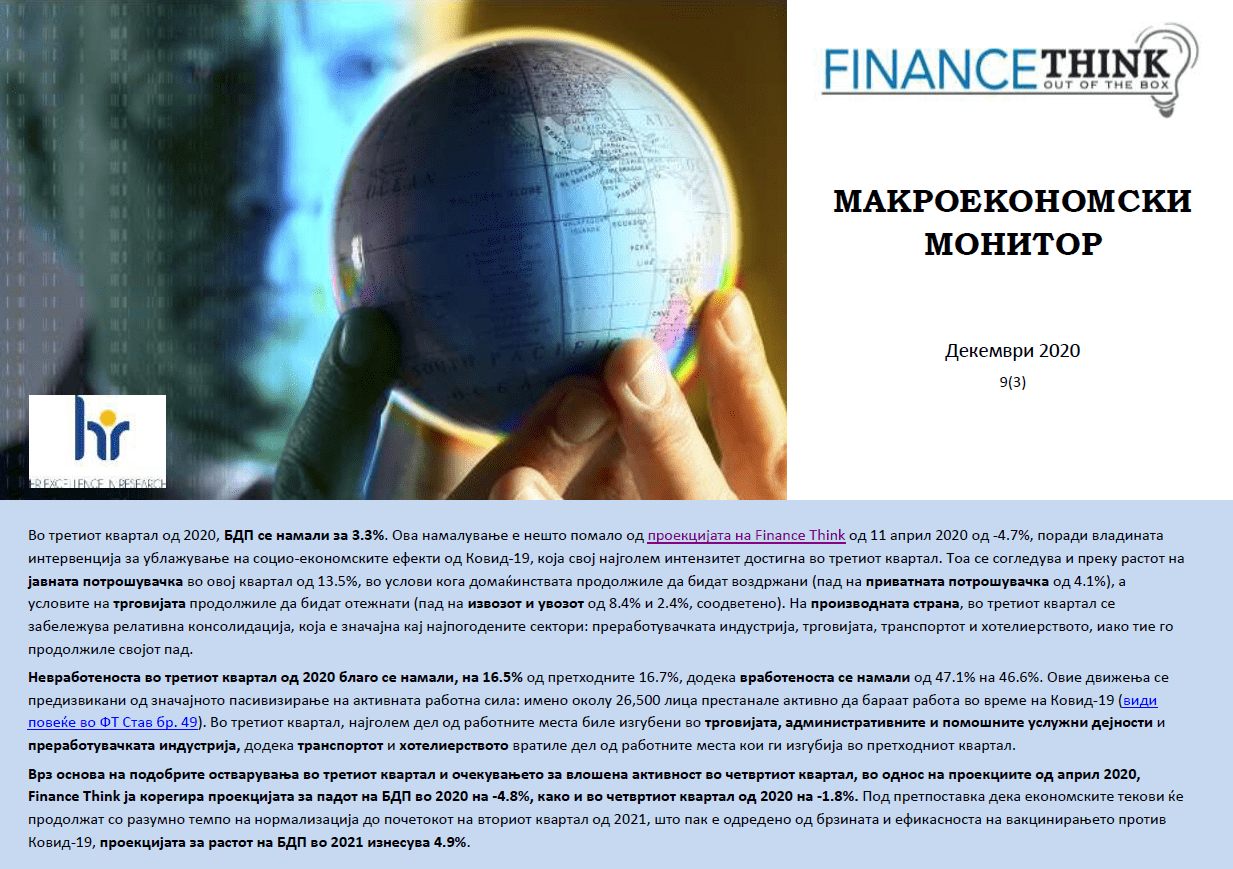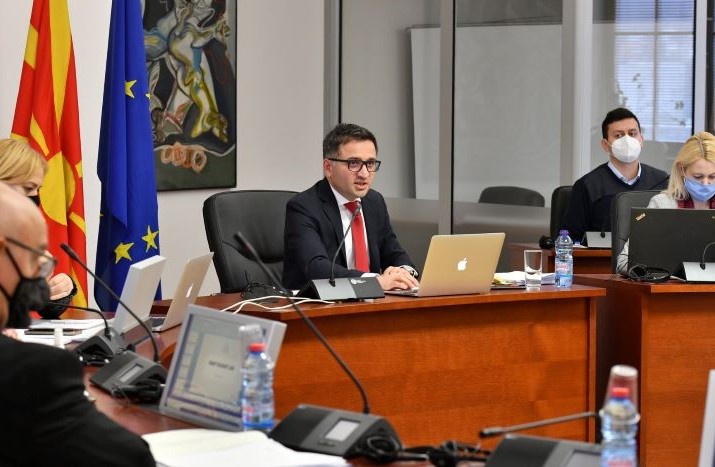Macro-monitor 9(3)
Finance Think participated in the public hearing on the draft Budget Law
Blagica Petreski, CEO of Finance Think explained the remarks from our FT Comment no. 30 of the Draft Law on Budgets (bit.ly/3ov58f1), i.e. the need for further specification and detailing in the area of medium-term budgeting, fiscal rules and the fiscal council. The hearing was organized by the Ministry of Finance.
Employment diagnostics in the municipalities in North Macedonia
The aim of the project is to diagnose the labor market in nine municipalities in North Macedonia.
Client: International Labor Organization
Citation: „The main concern in the labor market is not the unemployed, but those who have lost hope of getting a job“
Citation: “UNEMPLOYMENT DURING COVID-19”
ФТ Став бр. 49 за невработеноста во време на Ковид-19
Според Државниот завод за статистика, во периодот од април до септември 2020 година, што е периодот на пандемијата од коронавирусот Ковид-19, бројот на вработени лица се намалил за 25.500 лица, од кои 17.700 лица во вториот квартал, а остатокот од близу 8.000 лица во третиот квартал. Во истиот период, бројот на невработени останал скоро ист (односно забележано е дури и мало намалување од илјада лица).
Според Агенцијата за вработување, во истиот период, бројот на регистрирани невработени се зголемил за 43.600 лица.
Поради тоа што двата извора на информации за (не)вработеноста упатуваат на релативно различни движења, во јавноста оправдано се наметнува дебатата за тоа што навистина се случува со пазарот на трудот во Северна Македонија во време на пандемијата.
Најпрво, потребно е да се забележи дека двата извора на информации се различни. Официјалната вработеност и невработеност се објавува од Државниот завод за статистика, врз основа на методологија од Меѓународната организација на трудот. Според неа за невработени се сметаат лицата кои во неделата која претходела на анкетирањето не извршувале било каква работна активност, редовна или повремена, во времетраење од најмалку еден час, а притоа продолжиле активно да бараат работа и биле подготвени да ја прифатат доколку им биде понудена.
Бројките кои ги објавува Агенцијата за вработување се т.н. регистрирана вработеност и невработеност. Според нив, активно невработено лице се смета пријавено лице во АВРСМ кое нема работа и активно бара, според активности дефинирани во индивидуалниот план за вработување кој се води при АВРСМ и со обврска за месечно пријавување во Агенцијата. Останатите лица кои активно не бараат работа се водат во категоријата „други баратели на работа“. Но, карактеристично е што доколку активниот барател на работа не ја извршува својата обврска за месечно пријавување, кој одбил да заснова работен однос понуден од Агенцијата или одбил преквалификација се брише од евиденцијата на невработени лица.
Според последните податоци на АВРСМ, за периодот март-октомври 2020, состојбата со регистрираната невработеност е претставена на следната слика:

Имено, обемот на нови регистрирани невработени во текот на кризата потекнува од околу 16 илјади лица кои изгубиле работа, ново-пријавени невработени од околу 11 илјади, и нов прилив во регистрираната невработеност од околу 20 илјади.
Првото клучно прашање е дали бројот на регистрирани лица кои изгубиле работа (прилив во невработени од работен однос) дава доволна слика за пазарот на трудот во време на пандемијата од Ковид-19?
Одговорот е НЕ.
Второто клучно прашање е дали непроменетата стапка на невработеност објавена од ДЗС дава доволна слика за пазарот на трудот во време на пандемијата од Ковид-19?
Одговорот е НЕ.
При интерпретацијата на бројките за невработеноста е неопходнен поширок поглед на пазарот на трудот и крајна внимателност од носителите на политиките.
Причините за тоа се следни:
Прво, точно е дека околу 16 илјади лица изгубиле работа регулирана со договор за вработување, односно 25 илјади лица било каква работна активност (вклучително и неформално вработување) во текот на пандемијата, што е 2-3% од вкупната вработеност. Тоа е во линија со наодите на Finance Think презентирани во Бриф за политиките бр. 41: Дали беше неопходна финансиската поддршка на фирмите за задржување на работните места во време на Ковид-19?, според кој се очекуваше и се потврди дека клучната владина анти-Ковид-19 мерка „14.500 МКД по вработен месечно“ ќе придонесе кон релативно (времено) задржување на вработеноста, со очекување дека и шокот од пандемијата е од времен карактер.
Второ, сепак, притисокот на пазарот на трудот не се сведува само на овие 16 односно 25 илјади лица кои изгубиле работа. Имено, на пазарот има постојан прилив на лица кои првпат се пријавуваат во АВРСМ. Тоа се вообичаено ученици и студенти кои завршуваат со своето школување и првпат се регистрираат на пазарот на труд (т.н. entrants). Во набљудуваниот период, бројот на овие лица бил околу 11 илјади, а во истиот период од 2019 бил околу 7 илјади, што имплицира дека тој притисок се зголемил за повеќе од 50%. Имено, овие лица се соочени со значајно зголемен ризик од ненаоѓање работа, поради што се пријавуваат како активни баратели на работа во АВРСМ, почесто од тоа што се пријавувале во нормални околности. Слика 2 укажува дека побарувачката на работна сила во вториот квартал, во најпогодените сектори, значајно се намалила, што е приближен приказ на тоа дека притисокот на пазарот на трудот за подолго останување во состојба на (регистрирана) невработеност се зголемил.

Трето, најкарактеристична е регистрираната активација на над 20 илјади лица, кои претходно ги немало во регистрацијата на АВРСМ. Причините за тоа што ги немало во регистрираната невработеност не се детално познати, но тоа се: i) лица кои изгубиле надеж дека АВРСМ ќе им помогне да најдат работа, но притоа останале подготвени да прифатат работа надвор од државниот систем на посредување; ii) лица кои имале повремена, привремена или хонорарна работа, iii) лица со неформална работа (работа во сива економија); како и iv) лица кои евентуално не биле присутни во државата; поради што ваквите под-групи ги немало ниту во регистрираната вработеност ниту во регистрираната невработеност при АВРСМ.
Дел од новорегистрираните невработени во АВРСМ се секако и де-факто пасивни, односно ниту бараат работа, ниту се спремни да почнат доколку им се понуди, но се пријавиле како активни баратели на работа со цел да се стекнат со некое друго право (како на пример, правото на користење платежна картичка за државна помош). На тоа укажува и фактот од официјалната статистика на ДЗС според кој во време на пандемијата настанало драстично фактичко пасивизирање на населението за нови 26.500 лица. Фактичката пасивизација е особено изразена кај лицата со пониско образование и кај жените, кои и почесто вработување наоѓаа во најпогодените сектори од кризата.
Тоа го потврдува и нашата публикација Квалитет на живот бр. 3: „Економските ефекти од корона-кризата“, во која документиравме дека при ударот на Ковид-19, 1/3 од лицата без работа изгубиле надеж дека ќе најдат.
Оттука, во моментов, главната грижа на пазарот на труд не се невработените во целина, туку лицата кои изгубиле надеж дека ќе најдат вработување, и поради што се откажале од барање работа; како и лицата кои првпат транзитираат од образование на пазарот на трудот. Тие лица треба да бидат во фокусот на носителите на политиките, барем на исто ниво како што во фокус се вработените во погодените компании.
Finance Think упатува апел до носителите на политиките во сферата на пазарот на трудот да посветат особена внимателност кај лицата кои првпат се пријавуваат или се враќаат во системот за државно посредување при вработување, иако тие фактички изгубиле надеж за наоѓање работа. Имено:
- Од една страна, со цел оваа слика да не се изобличува, ја повикуваме Владата да не го користи критериумот за „активно барање работа“ при доделување државна помош на лица. За овие помошти доволен е критериумот за остварениот доход по која било основа во одреден период пред доделување на помошта;
- Сепак, од друга страна, неопходна е активност на АВРСМ со која ќе се ограничи фактичката пасивизација на барателите на работа. Во таа насока, неопходно е да се подигне интензитетот и ефикасноста на мерките за побрзо вклучување во пазарот на труд и вработување, како на пример преку системот на профилирање и вкрстување со пазарната побарувачка, зголемување на издашноста на активните мерки за вработување, особено пак имајќи предвид дека во третиот квартал побарувачката за работна сила се врати скоро на пред-пандемиското ниво, иако со ризик од повторно опаѓање во четвртиот квартал.
Statement: „The poor become even poorer“
Gender responsive budgeting in times of pandemic
The project aims to improve the position of women and reduce gender inequality in the labor market in the long run. A detailed examination of the use of gender responsive budgeting in active employment measures will provide a basis for designing new measures and models to improve the position of women in the labor market and mitigate the socio-economic consequences of the crisis and / or recommendations for redesign of existing measures in order to design gender-responsive measures that best meet the needs and characteristics of women.
Donor: Center for Research and Policy Making through the Gender Budget Watchdog Network
Timeline: December 2020 – May 2021







